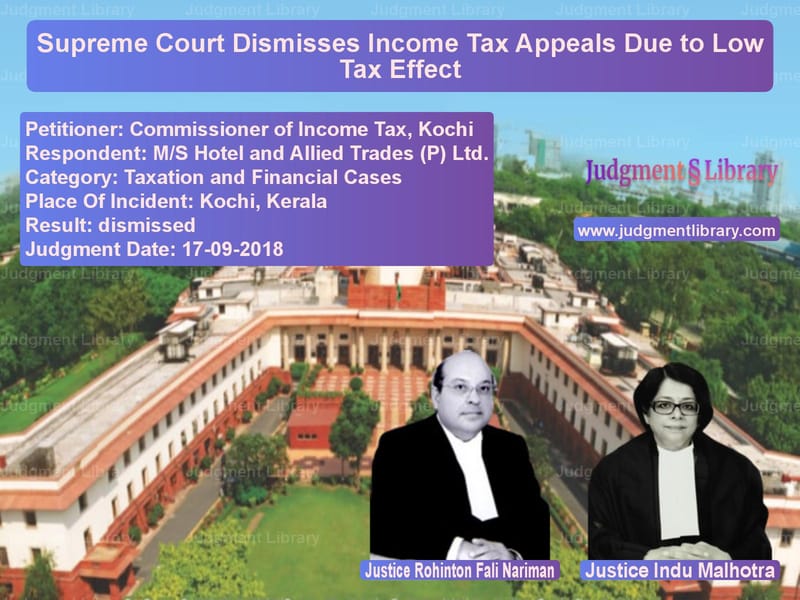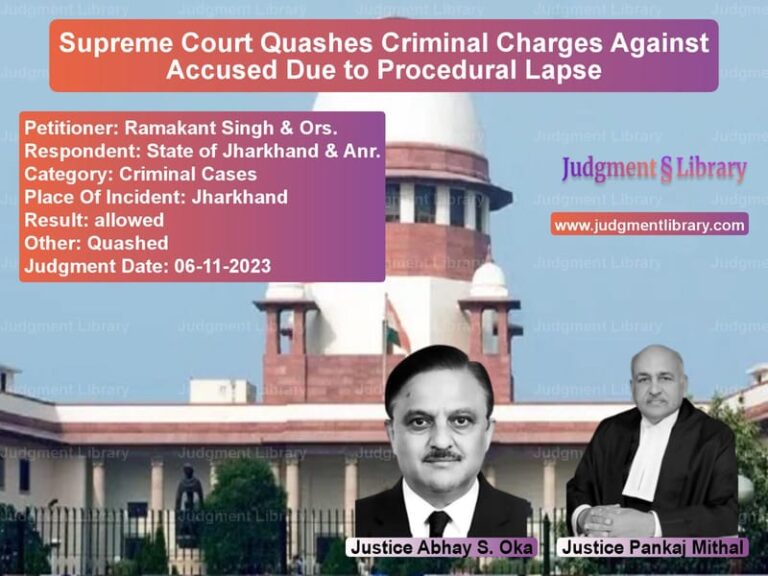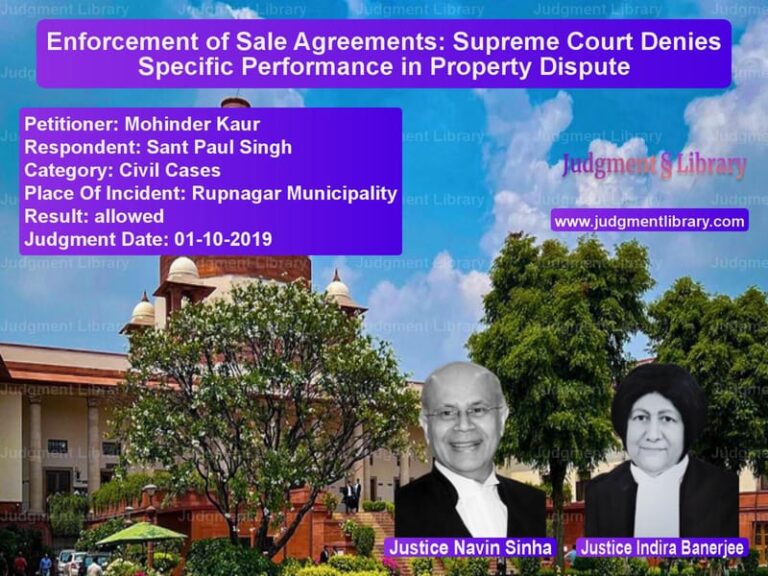Supreme Court Dismisses Income Tax Appeals Due to Low Tax Effect
The Supreme Court, in its judgment dated September 17, 2018, in the case of Commissioner of Income Tax, Kochi vs. M/S Hotel and Allied Trades (P) Ltd., ruled in favor of dismissing multiple tax appeals filed by the Commissioner of Income Tax (CIT) due to the tax effect being below the monetary threshold set by the Central Board of Direct Taxes (CBDT). The Court upheld the tax department’s obligation to comply with administrative guidelines designed to reduce litigation in income tax matters.
Background of the Case
The dispute arose when the Commissioner of Income Tax (CIT) challenged decisions of the Income Tax Appellate Tribunal (ITAT) that had ruled in favor of various assessees, including M/S Hotel and Allied Trades (P) Ltd. These cases primarily involved deductions, reassessments, and disallowances under the Income Tax Act, 1961.
While the tax authorities sought to challenge these decisions before the Supreme Court, the CBDT issued a circular setting monetary thresholds for tax appeals. As per the latest notification, the revenue department was advised not to file appeals where the tax effect was below Rs. 1 Crore. This policy was introduced to ensure that resources were utilized effectively and courts were not burdened with cases involving minor financial implications.
Arguments by the Petitioner (Commissioner of Income Tax)
The Commissioner of Income Tax argued:
- The ITAT had erred in granting relief to the assessees, leading to a loss of revenue to the exchequer.
- Even if the tax effect was below the monetary threshold, the appeals should be entertained due to the legal importance of the issues involved.
- Several cases involved recurring tax liabilities, and a precedent from the Supreme Court could have an impact on future assessments.
- The CBDT circular should not be applied retrospectively to cases that were already in litigation.
Arguments by the Respondent (M/S Hotel and Allied Trades (P) Ltd.)
The respondent, M/S Hotel and Allied Trades (P) Ltd., along with other assessees, countered these claims:
- The tax department was bound by the CBDT’s circular and could not arbitrarily pursue appeals.
- The ITAT’s decisions were based on a correct interpretation of the law and had been upheld by various High Courts.
- The department had a history of filing appeals indiscriminately, leading to judicial backlog.
- Their cases did not involve substantial legal questions that warranted Supreme Court intervention.
Supreme Court’s Observations
The Supreme Court, comprising Justices Rohinton Fali Nariman and Indu Malhotra, examined the arguments and made several key observations.
1. Adherence to CBDT Circular
The Court held that the CBDT’s circular on monetary thresholds was binding on tax authorities:
“The monetary threshold prescribed by the CBDT is mandatory, and the revenue department is required to abide by it.”
2. Purpose of Monetary Limits
The Court acknowledged that the CBDT had introduced monetary limits to prevent frivolous litigation and reduce the burden on courts:
“The purpose of setting monetary limits is to enable the revenue authorities to focus on high-value disputes that have significant revenue implications.”
3. No Exceptional Circumstances Justifying Appeals
The Supreme Court found that none of the cases involved exceptional circumstances that would warrant an exemption from the CBDT’s circular.
4. Tax Department Must Follow Administrative Policies
The judgment reaffirmed that the tax department could not arbitrarily choose which cases to appeal:
“The revenue department cannot selectively ignore administrative guidelines to pursue appeals that do not meet the prescribed criteria.”
Final Judgment
The Supreme Court ruled:
- The appeals filed by the Commissioner of Income Tax were dismissed.
- The Court condoned any delays in filing the appeals.
- The revenue department was directed to strictly adhere to the CBDT circular for all future cases.
Implications of the Judgment
This ruling has significant implications for tax litigation in India.
1. Compliance with CBDT Guidelines
The judgment reinforces that tax authorities must follow CBDT circulars regarding monetary limits for appeals.
2. Reduction in Unnecessary Tax Litigation
The ruling ensures that only high-value tax disputes reach higher courts, thereby reducing judicial backlog and allowing courts to focus on important tax matters.
3. Focus on Substantial Tax Matters
The revenue department can now focus on larger tax disputes that have a broader financial impact rather than pursuing cases of minimal tax effect.
4. Efficient Use of Judicial Resources
The Supreme Court’s decision aligns with the broader policy objective of minimizing unnecessary tax litigation and ensuring efficient use of judicial resources.
Conclusion
The Supreme Court’s decision in Commissioner of Income Tax, Kochi vs. M/S Hotel and Allied Trades (P) Ltd. underscores the importance of following administrative guidelines in tax litigation. By dismissing the appeals, the Court reinforced the policy of reducing unnecessary tax disputes and ensuring judicial efficiency in tax matters. This judgment serves as a crucial precedent in limiting frivolous appeals and streamlining tax litigation in India.
Petitioner Name: Commissioner of Income Tax, Kochi.Respondent Name: M/S Hotel and Allied Trades (P) Ltd..Judgment By: Justice Rohinton Fali Nariman, Justice Indu Malhotra.Place Of Incident: Kochi, Kerala.Judgment Date: 17-09-2018.
Don’t miss out on the full details! Download the complete judgment in PDF format below and gain valuable insights instantly!
Download Judgment: Commissioner of Inco vs MS Hotel and Allied Supreme Court of India Judgment Dated 17-09-2018.pdf
Direct Downlaod Judgment: Direct downlaod this Judgment
See all petitions in Income Tax Disputes
See all petitions in Tax Refund Disputes
See all petitions in GST Law
See all petitions in Judgment by Rohinton Fali Nariman
See all petitions in Judgment by Indu Malhotra
See all petitions in dismissed
See all petitions in supreme court of India judgments September 2018
See all petitions in 2018 judgments
See all posts in Taxation and Financial Cases Category
See all allowed petitions in Taxation and Financial Cases Category
See all Dismissed petitions in Taxation and Financial Cases Category
See all partially allowed petitions in Taxation and Financial Cases Category







